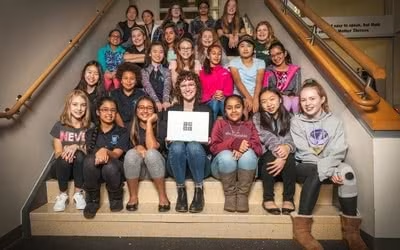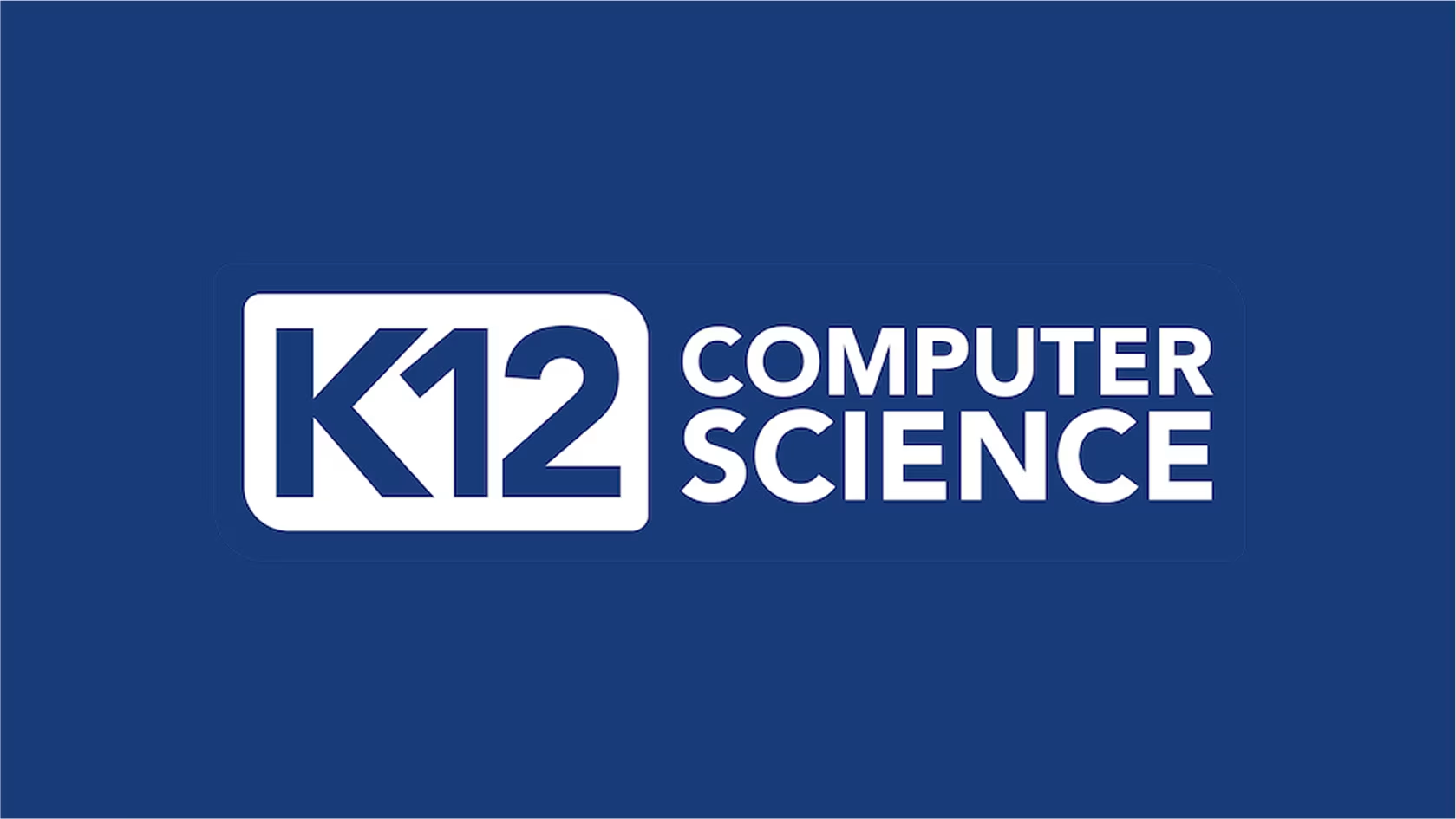Empowering Every Student to Thrive in an AI-Powered World
Code.org is an education innovation nonprofit dedicated to the vision that every student in every school has the opportunity to learn about artificial intelligence (AI) and computer science (CS) as part of their core K-12 education.
Code.org's Results
The leading provider of K-12 AI and CS education curriculum across the globe, Code.org also organizes the annual Hour of AI campaign, building on the legacy of the Hour of Code, which has engaged more than 15% of all students in the world. Code.org is supported by generous donors including Microsoft, Amazon, Google, and many others.
Code.org increases participation in AI+CS education by reaching students of all backgrounds where they are — at their skill level, in their schools, and in ways that inspire them to keep learning. Reaching every student is foundational to our work.
107M
Students accounts
3M
Teachers supported
232M
Student projects
50%
Underrepresented racial/ethnic groups
45%
Title I or Free and reduced lunch
48%
Female & gender expansive
How we approach our work
Code.org increases participation in AI+CS education by reaching students of all backgrounds where they are — at their skill level, in their schools, and in ways that inspire them to keep learning. Reaching every student is foundational to our work. We expand access to and participation in AI education and CS in schools, with a focus on increasing participation by young women and students from other underrepresented groups.
Shared values
Our guiding principles shape how we collaborate, advocate, and drive change across the movement we've built.
Unifying approach
We bring together diverse voices and partners around a common vision to expand AI+CS education access for every student.
Focus on diversity
We reach students of all backgrounds with learning that meets them where they are—across skill levels, schools, and communities.
OUR HISTORY
Where it all started
In 2013, Code.org was launched by twin brothers Hadi and Ali Partovi with a simple video promoting the idea that everyone should learn computer science. That video went viral and thousands of schools reached out for help. Since then, we’ve grown from a scrappy volunteer team into a global nonprofit working to make AI+CS education accessible to every student.

OUR GOAL
Driving change in education
We work to ensure every student can access computer science and AI—regardless of background. From inclusive curriculum and teacher training to partnerships and policy change, we’re reshaping education. Globally, we challenge stereotypes through storytelling, research, and outreach.
OUR SUPPORTERS
Powered by a global community
Our work is made possible by decades of dedication from individuals and organizations who’ve helped build, fund, and champion AI+CS education. We’re deeply grateful to the entire AI+CS education community for fueling this movement and expanding opportunity for students worldwide.
Outside of the US, our team works closely with more than 100 international partners, helping them expand AI+CS education. We also keep AI+CS education in the international education discourse by partnering with ministries of education from around the world and working with international organizations like the Organization for Economic Co-operation and Development.
Our ongoing commitments
Commitment to open source curriculum:
Our curriculum and tutorials are free, open, and built to be shared. Licensed under Creative Commons, our materials can be used, adapted, and remixed by educators around the world for non-commercial purposes. We believe that every student and teacher should always have access to high-quality foundational learning materials, with open resources remaining at the heart of what we do.
Our Commitment to a Unifying, Nonpartisan Approach:
Code.org’s mission unites people across political, cultural, and geographic divides. We work with educators, policymakers, and industry leaders from across the spectrum to advance computer science and AI education in every school, without partisanship or ideology. Our focus is on what unites us: preparing young people for the future.
Our commitment to accessibility:
To make computer science and AI truly for every student, we design our programs and tools with accessibility at the core. We work continuously to identify and eliminate barriers that limit participation by students with disabilities; ensuring that every learner can engage fully and meaningfully in computer science and AI education.
Our Commitment to Teach Ethics Without Editorial Bias:
Code.org helps students question and understand the ethical and societal dimensions of technology, but we do not prescribe what to think. Our curriculum encourages inquiry while avoiding political or moral positions. We equip learners to think critically, not to adopt a predetermined view.
Our Commitment to Student Privacy:
Code.org is deeply committed to protecting student privacy. We collect the minimum data necessary to deliver our courses, never sell student information, and design all of our tools to comply with COPPA, FERPA, GDPR, and other leading privacy standards. We believe every learner deserves to explore computer science and AI in a safe, trusted environment; where their data is used only to support their education.
Our Commitment to a Student-First Technology Platform:
Code.org relies on generous support from a broad group of technology companies to deliver our computer science and AI education, and we use clear guidelines to manage these partnerships. These principles ensure the platform remains a collaborative learning space, not a competitive arena, by strictly maintaining a non-commercial, ad-free environment. We prioritize student experience in all technology choices, and offer teachers multiple options when possible to support the broadest access and an inclusive ecosystem.
Code.org relies on generous support from a broad group of technology companies to deliver our computer science and AI education, and we use clear guidelines to manage these partnerships. These principles ensure the platform remains a collaborative learning space, not a competitive arena, by strictly maintaining a non-commercial, ad-free environment. We prioritize student experience in all technology choices, and offer teachers multiple options when possible to support the broadest access and an inclusive ecosystem.
Commitment to open source curriculum:
Our curriculum and tutorials are free, open, and built to be shared. Licensed under Creative Commons, our materials can be used, adapted, and remixed by educators around the world for non-commercial purposes. We believe that every student and teacher should always have access to high-quality foundational learning materials, with open resources remaining at the heart of what we do.
Our commitment to a unifying, nonpartisan approach:
Code.org’s mission unites people across political, cultural, and geographic divides. We work with educators, policymakers, and industry leaders from across the spectrum to advance computer science and AI education in every school, without partisanship or ideology. Our focus is on what unites us: preparing young people for the future.
Our commitment to accessibility:
To make computer science and AI truly for every student, we design our programs and tools with accessibility at the core. We work continuously to identify and eliminate barriers that limit participation by students with disabilities, ensuring that every learner can engage fully and meaningfully in computer science and AI education.
Our commitment to teach ethics without editorial bias:
Code.org helps students question and understand the ethical and societal dimensions of technology, but we do not prescribe what to think. Our curriculum encourages inquiry while avoiding political or moral positions. We equip learners to think critically, not to adopt a predetermined view.
Our commitment to student privacy:
Code.org is deeply committed to protecting student privacy. We collect the minimum data necessary to deliver our courses, never sell student information, and design all of our tools to comply with COPPA, FERPA, GDPR, and other leading privacy standards. We believe every learner deserves to explore computer science and AI in a safe, trusted environment where their data is used only to support their education.
Our commitment to a student-first technology platform:
Code.org relies on generous support from a broad group of technology companies to deliver our computer science and AI education, and we use clear guidelines to manage these partnerships. These principles ensure the platform remains a collaborative learning space, not a competitive arena, by strictly maintaining a non-commercial, ad-free environment. We prioritize student experience in all technology choices, and offer teachers multiple options when possible to support the broadest access and an inclusive ecosystem.
Code.org relies on generous support from a broad group of technology companies to deliver our computer science and AI education, and we use clear guidelines to manage these partnerships. These principles ensure the platform remains a collaborative learning space, not a competitive arena, by strictly maintaining a non-commercial, ad-free environment. We prioritize student experience in all technology choices, and offer teachers multiple options when possible to support the broadest access and an inclusive ecosystem.
Commitment to open source curriculum:
Our curriculum and tutorials are free, open, and built to be shared. Licensed under Creative Commons, our materials can be used, adapted, and remixed by educators around the world for non-commercial purposes. We believe that every student and teacher should always have access to high-quality foundational learning materials, with open resources remaining at the heart of what we do.
Our commitment to accessibility:
To make computer science and AI truly for every student, we design our programs and tools with accessibility at the core. We work continuously to identify and eliminate barriers that limit participation by students with disabilities; ensuring that every learner can engage fully and meaningfully in computer science and AI education.
Our Commitment to Student Privacy:
Code.org is deeply committed to protecting student privacy. We collect the minimum data necessary to deliver our courses, never sell student information, and design all of our tools to comply with COPPA, FERPA, GDPR, and other leading privacy standards. We believe every learner deserves to explore computer science and AI in a safe, trusted environment; where their data is used only to support their education.
Our Commitment to a Unifying, Nonpartisan Approach:
Code.org’s mission unites people across political, cultural, and geographic divides. We work with educators, policymakers, and industry leaders from across the spectrum to advance computer science and AI education in every school, without partisanship or ideology. Our focus is on what unites us: preparing young people for the future.
Our Commitment to Teach Ethics Without Editorial Bias:
Code.org helps students question and understand the ethical and societal dimensions of technology, but we do not prescribe what to think. Our curriculum encourages inquiry while avoiding political or moral positions. We equip learners to think critically, not to adopt a predetermined view.
Our Commitment to a Student-First Technology Platform:
Code.org relies on generous support from a broad group of technology companies to deliver our computer science and AI education, and we use clear guidelines to manage these partnerships. These principles ensure the platform remains a collaborative learning space, not a competitive arena, by strictly maintaining a non-commercial, ad-free environment. We prioritize student experience in all technology choices, and offer teachers multiple options when possible to support the broadest access and an inclusive ecosystem.
Commitment to open source curriculum:
Our curriculum and tutorials are free, open, and built to be shared. Licensed under Creative Commons, our materials can be used, adapted, and remixed by educators around the world for non-commercial purposes. We believe that every student and teacher should always have access to high-quality foundational learning materials, with open resources remaining at the heart of what we do.
Our commitment to accessibility:
To make computer science and AI truly for every student, we design our programs and tools with accessibility at the core. We work continuously to identify and eliminate barriers that limit participation by students with disabilities; ensuring that every learner can engage fully and meaningfully in computer science and AI education.
Our Commitment to Student Privacy:
Code.org is deeply committed to protecting student privacy. We collect the minimum data necessary to deliver our courses, never sell student information, and design all of our tools to comply with COPPA, FERPA, GDPR, and other leading privacy standards. We believe every learner deserves to explore computer science and AI in a safe, trusted environment; where their data is used only to support their education.
Our Commitment to a Unifying, Nonpartisan Approach:
Code.org’s mission unites people across political, cultural, and geographic divides. We work with educators, policymakers, and industry leaders from across the spectrum to advance computer science and AI education in every school, without partisanship or ideology. Our focus is on what unites us: preparing young people for the future.
Our Commitment to Teach Ethics Without Editorial Bias:
Code.org helps students question and understand the ethical and societal dimensions of technology, but we do not prescribe what to think. Our curriculum encourages inquiry while avoiding political or moral positions. We equip learners to think critically, not to adopt a predetermined view.
Our Commitment to a Student-First Technology Platform:
Code.org relies on generous support from a broad group of technology companies to deliver our computer science and AI education, and we use clear guidelines to manage these partnerships. These principles ensure the platform remains a collaborative learning space, not a competitive arena, by strictly maintaining a non-commercial, ad-free environment. We prioritize student experience in all technology choices, and offer teachers multiple options when possible to support the broadest access and an inclusive ecosystem.
Commitment to open source curriculum

Our curriculum resources and tutorials licensed under a Creative Commons license will forever be free to use and open. We also allow others to make derivative education resources for non-commercial purposes.
Our commitment to accessibility

To achieve our goal of access for every student, we work to identify and eliminate barriers that prevent the inclusion and full participation of students and educators with disabilities.
Our generous donors
Code.org® is a registered public 501c3 nonprofit, with support from the general public. We are grateful for the generous support we've received from individuals and organizations who support our vision.
Code.org's accomplishments (above) demonstrate our ability to efficiently use those contributions to drive massive change. Each year, we have to raise enough funding to fuel our mission. We deeply appreciate any contributions in helping us meet our vision.
IRS Form 990
Code.org in the News
Explore news stories, press coverage, and announcements featuring Code.org’s work to expand computer science and AI education around the world.
Spread the word
Amplify our impact by sharing Code.org with your network. From social media to email updates, discover how you can help us reach more educators, students, and advocates.
Follow us on social media
Stay up to date with us on social media and share our posts with your network to stay informed and help drive awareness.
Hear more from Code.org
For the latest updates, follow the Code.org blog! You can read in-depth stories about our teachers, news from our partners, and the latest research on how we're helping students.
Promote Code.org
Promote our movement in your area with the help of stats, quotes, and videos.

Meet the team behind the mission
Code.org is powered by a passionate team of educators, engineers, storytellers, and advocates. From classroom innovation to national policy, our people drive change at every level.
Interested in joining our team?
Stay informed on AI+CS education
Join our community of educators, parents, and advocates by signing up for the latest updates on AI+CS education and Code.org initiatives. Be the first to receive news, resources, and opportunities to support AI+CS learning.
You can unsubscribe at any time.
Additional resources
Code.org Impact Reports

Discover Code.org’s progress and results through our impact reports, highlighting key milestones, initiatives, and data from each year of our work.
K-12 Computer Science

Code.org founded the steering committee that helped establish the K-12 Computer Science Framework — a guide for states, districts, and organizations implementing AI+CS education.
K-12 AI Education Frameworks

We founded the TeachAI coalition, in partnership with Khan Academy, ISTE and ETS, which has established a Global AI Literacy Framework.
Advocacy Coalition

Join our advocacy coalition, which advocates (on a non-partisan basis) for policies such as graduation requirements for AI+CS education to ensure access for every student.





